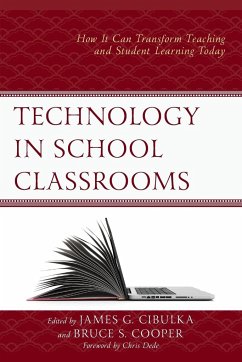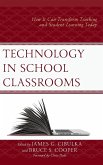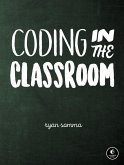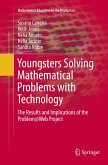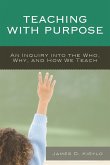Technology in School Classrooms
How It Can Transform Teaching and Student Learning Today
Herausgeber: Cibulka, James G.; Cooper, Bruce S.
Technology in School Classrooms
How It Can Transform Teaching and Student Learning Today
Herausgeber: Cibulka, James G.; Cooper, Bruce S.
- Broschiertes Buch
- Merkliste
- Auf die Merkliste
- Bewerten Bewerten
- Teilen
- Produkt teilen
- Produkterinnerung
- Produkterinnerung
This book addresses whether digital technologies can transform teaching and learning in America's P-12 classrooms.
Andere Kunden interessierten sich auch für
![Technology in School Classrooms Technology in School Classrooms]() Technology in School Classrooms93,99 €
Technology in School Classrooms93,99 €![Coding in the Classroom: Why You Should Care about Teaching Computer Science Coding in the Classroom: Why You Should Care about Teaching Computer Science]() Ryan SommaCoding in the Classroom: Why You Should Care about Teaching Computer Science14,99 €
Ryan SommaCoding in the Classroom: Why You Should Care about Teaching Computer Science14,99 €![Youngsters Solving Mathematical Problems with Technology Youngsters Solving Mathematical Problems with Technology]() Susana CarreiraYoungsters Solving Mathematical Problems with Technology37,99 €
Susana CarreiraYoungsters Solving Mathematical Problems with Technology37,99 €![Teaching with Purpose Teaching with Purpose]() James D. KiryloTeaching with Purpose79,99 €
James D. KiryloTeaching with Purpose79,99 €![Why Kids Can't Read Why Kids Can't Read]() Why Kids Can't Read72,99 €
Why Kids Can't Read72,99 €![Teaching with Purpose Teaching with Purpose]() James D. KiryloTeaching with Purpose43,99 €
James D. KiryloTeaching with Purpose43,99 €![Why Kids Can't Read Why Kids Can't Read]() Why Kids Can't Read135,99 €
Why Kids Can't Read135,99 €-
-
-
This book addresses whether digital technologies can transform teaching and learning in America's P-12 classrooms.
Hinweis: Dieser Artikel kann nur an eine deutsche Lieferadresse ausgeliefert werden.
Hinweis: Dieser Artikel kann nur an eine deutsche Lieferadresse ausgeliefert werden.
Produktdetails
- Produktdetails
- Verlag: Globe Pequot Publishing Group Inc/Bloomsbury
- Seitenzahl: 198
- Erscheinungstermin: 31. Dezember 2017
- Englisch
- Abmessung: 229mm x 152mm x 11mm
- Gewicht: 295g
- ISBN-13: 9781475831047
- ISBN-10: 1475831048
- Artikelnr.: 48896103
- Herstellerkennzeichnung
- Produktsicherheitsverantwortliche/r
- Europaallee 1
- 36244 Bad Hersfeld
- gpsr@libri.de
- Verlag: Globe Pequot Publishing Group Inc/Bloomsbury
- Seitenzahl: 198
- Erscheinungstermin: 31. Dezember 2017
- Englisch
- Abmessung: 229mm x 152mm x 11mm
- Gewicht: 295g
- ISBN-13: 9781475831047
- ISBN-10: 1475831048
- Artikelnr.: 48896103
- Herstellerkennzeichnung
- Produktsicherheitsverantwortliche/r
- Europaallee 1
- 36244 Bad Hersfeld
- gpsr@libri.de
James G. Cibulka, Ph.D. Throughout his career as an educator, Cibulka has advocated for reforms that support greater student learning opportunities, particularly for disadvantaged youth. He has been a K-12 teacher, university professor, dean, and founding president of the Council for Accreditation of Educator Preparation. He is a former president of the Politics of Education Association (PEA) and senior editor of Educational Administration Quarterly. Bruce S. Cooper, Ph.D. is Professor Emeritus at Fordham University, a scholar and researcher in the areas of private and religious schools, with an interest in school administration and policy. He was President of the Politics of Education Association (PEA), a recipient of the Jay D. Scriber Mentoring Award, from University Council Educational Administration, 2008; and President: Associates for Research on Private Education (ARPE), SIG of AERA; and Editor of the Private School Monitor, 2007-2012.
Foreword. Next-Generation Learning in School Chris Dede Introduction to the
Topic -- and the Book James G. Cibulka and Bruce S. Cooper Chapter 1:
Technology's Role and Place in Student Learning: What We Have Learned from
Research and Theories Kui Xie and Nathan A. Hawk Chapter 2: Teacher
Professional Development in the Digital Age: Design and Implementation of
Learning Without Limits Stephanie Hirsh and Michelle Bowman King Chapter 3:
The State of K-12 Online Learning Michael K. Barbour Chapter 4: Building
Foundational Skills in Learners with Special Needs Through the Use of
Technology Ted S. Hasselbring and Margaret E. Bausch Chapter 5: Assessment
Technology as a Tool to Strengthen Teaching and Student Learning Michael
Russell Chapter 6: Emerging Technologies and Changing Practices in Science
Classrooms John A. Craven III and Tracy Hogan Chapter 7: Economic Effects
of Technology: Costs and Distribution of Resources to Support Student
Learning Lawrence O. Picus Chapter 8: The Role of School Leaders in
Leveraging Technology to Transform P-12 Classrooms James G. Cibulka Chapter
9: The Current Role of Schools of Education in Preparing a Technologically
Literate Teaching Workforce Karen Symms Gallagher Chapter 10: Conclusion
James G. Cibulka About the Authors Index
Topic -- and the Book James G. Cibulka and Bruce S. Cooper Chapter 1:
Technology's Role and Place in Student Learning: What We Have Learned from
Research and Theories Kui Xie and Nathan A. Hawk Chapter 2: Teacher
Professional Development in the Digital Age: Design and Implementation of
Learning Without Limits Stephanie Hirsh and Michelle Bowman King Chapter 3:
The State of K-12 Online Learning Michael K. Barbour Chapter 4: Building
Foundational Skills in Learners with Special Needs Through the Use of
Technology Ted S. Hasselbring and Margaret E. Bausch Chapter 5: Assessment
Technology as a Tool to Strengthen Teaching and Student Learning Michael
Russell Chapter 6: Emerging Technologies and Changing Practices in Science
Classrooms John A. Craven III and Tracy Hogan Chapter 7: Economic Effects
of Technology: Costs and Distribution of Resources to Support Student
Learning Lawrence O. Picus Chapter 8: The Role of School Leaders in
Leveraging Technology to Transform P-12 Classrooms James G. Cibulka Chapter
9: The Current Role of Schools of Education in Preparing a Technologically
Literate Teaching Workforce Karen Symms Gallagher Chapter 10: Conclusion
James G. Cibulka About the Authors Index
Foreword. Next-Generation Learning in School Chris Dede Introduction to the
Topic -- and the Book James G. Cibulka and Bruce S. Cooper Chapter 1:
Technology's Role and Place in Student Learning: What We Have Learned from
Research and Theories Kui Xie and Nathan A. Hawk Chapter 2: Teacher
Professional Development in the Digital Age: Design and Implementation of
Learning Without Limits Stephanie Hirsh and Michelle Bowman King Chapter 3:
The State of K-12 Online Learning Michael K. Barbour Chapter 4: Building
Foundational Skills in Learners with Special Needs Through the Use of
Technology Ted S. Hasselbring and Margaret E. Bausch Chapter 5: Assessment
Technology as a Tool to Strengthen Teaching and Student Learning Michael
Russell Chapter 6: Emerging Technologies and Changing Practices in Science
Classrooms John A. Craven III and Tracy Hogan Chapter 7: Economic Effects
of Technology: Costs and Distribution of Resources to Support Student
Learning Lawrence O. Picus Chapter 8: The Role of School Leaders in
Leveraging Technology to Transform P-12 Classrooms James G. Cibulka Chapter
9: The Current Role of Schools of Education in Preparing a Technologically
Literate Teaching Workforce Karen Symms Gallagher Chapter 10: Conclusion
James G. Cibulka About the Authors Index
Topic -- and the Book James G. Cibulka and Bruce S. Cooper Chapter 1:
Technology's Role and Place in Student Learning: What We Have Learned from
Research and Theories Kui Xie and Nathan A. Hawk Chapter 2: Teacher
Professional Development in the Digital Age: Design and Implementation of
Learning Without Limits Stephanie Hirsh and Michelle Bowman King Chapter 3:
The State of K-12 Online Learning Michael K. Barbour Chapter 4: Building
Foundational Skills in Learners with Special Needs Through the Use of
Technology Ted S. Hasselbring and Margaret E. Bausch Chapter 5: Assessment
Technology as a Tool to Strengthen Teaching and Student Learning Michael
Russell Chapter 6: Emerging Technologies and Changing Practices in Science
Classrooms John A. Craven III and Tracy Hogan Chapter 7: Economic Effects
of Technology: Costs and Distribution of Resources to Support Student
Learning Lawrence O. Picus Chapter 8: The Role of School Leaders in
Leveraging Technology to Transform P-12 Classrooms James G. Cibulka Chapter
9: The Current Role of Schools of Education in Preparing a Technologically
Literate Teaching Workforce Karen Symms Gallagher Chapter 10: Conclusion
James G. Cibulka About the Authors Index

